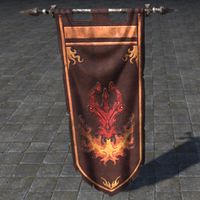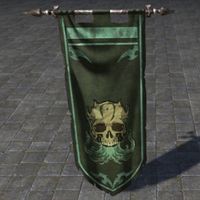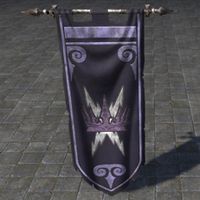User:Vincentius1/Misc
Contents
Arena Gladiatorial Teams[edit]
A list of all the original Arena gladiatorial teams re-surfacing in lore throughout the years.
Original TES: Arena texts at the Imperial Library
Direct Connections[edit]
- The Blackcasters
- The Firedrakes
- Original Town: Torval
- One of three factions that are the most intact from this original gladiatorial concept. The Pit Daemons are one of the playable factions in ESO's battlegrounds mode.
- The Iceblades
- The Pit Daemons
- Original Town: Helstrom
- One of three factions that are the most intact from this original gladiatorial concept. The Pit Daemons are one of the playable factions in ESO's battlegrounds mode.
- The Rangers
- The Stormlords
- Original Town: Narsis
- One of three factions that are the most intact from this original gladiatorial concept. The Stormlords are one of the playable factions in ESO's battlegrounds mode.
- The War Mages
- Original Town: Shornhelm
- The War Mages of Shornhelm is an alternate name for the Order of the Crypt, a knightly order based in the Crypt of Hearts, a location in the Kingdom of Shornhelm.[4] They are first mentioned in the Spell Knight Armor creation in Skyrim.
Indirect Connections[edit]
- The Blades
- The Chimeras
- Original Town: Southpoint
- Chimeras were an obscure topic in lore until they were expanded upon in ESO's Firesong DLC.
- The Griffins
- Original Town: Sunhold
- While Gryphons are not specifically associated with Sunhold, the city has a strong affiliation with the creature. The tradition of Sunhold's ruler having a gryphon companion dates back to Ulorome, who founded the city's dynasty and raised the first gryphon in a line of legendary steeds.[5]
- The Nightrunners
- Original Town: Alabaster
- The Night Runners are a bandit clan from Summerset Isle and lived in Karnwasten at the time ESO's Summerset chapter takes place.[6]
- The Reavers
- Original Town: Ebonheart
- A "reaver" is a term used by Nords of Solstheim to refer to off-island raiders from the Sea of Ghosts.[7]
References[edit]
- ^ The Flourishing of Elinhir — Garold Farfly
- ^ The Gray Cowl Returns in Skyrim
- ^ Tattooed Mammoth-Ball Trophy contraband text in ESO
- ^ Crypt of the Heart - Draft — Ariana Dumas
- ^ The Flight of Gryphons
- ^ Night Runners in ESO: Summerset
- ^ Reavers generic description in Morrowind: Bloodmoon
Minor Daggerfall cities and settlements referenced in newer games and lore[edit]
- Baelborne
- Appears in Daggerfall as a four block village in Shalgora with a Temple of Stendarr
- Appears in ESO as a ruined estate near Daggerfall and as the name of a cursed Breton noble family
- Crosswych
- Appears in Daggerfall as a four block village in Urvaius
- Appears in ESO as a mining town in King's Guard, between Glenumbra and Stormhaven
- Grimtry Garden
- Appears in Daggerfall as a walled city in Kambria with every guild and a Resolution of Z'en
- Appears in Charwich-Koniinge Letters
- Kalaan
- Appears in Daggerfall as a walled city in Tigonus interior with a Fighters/Mages guild and a House of Dibella
- Appears in the Loranna's RP, Campaign 13 – War of the Wormgod as a dusty fort on the coast
- Old Barbyn's Farm
- Appears in Daggerfall as a single-block settlement with one house in Phrygias, one pixel away from the Skeffington Coven.
- Appears in The Last Year of the First Era and is where the Skeffington Coven meets.
- Ramakawan
- Appears in Daggerfall...
- Appears in the Loranna's RP, Campaign 13 – War of the Wormgod as King Lhotun's hidden fortress
- Westtry
- Appears in Daggerfall as a walled city in Daenia with every guild and a House of Julianos
- Appears in ESO as an abandoned town near Camlorn haunted by ghosts
Books from the future brought to ESO's time[edit]
Its explained that books from the future could have been brought to the mid-Second Era because of the Gandranen Ruins' magic but some of these books were changed to fit the time, like Father of the Niben changing "Anticlere" to "Reich Gradkeep" or removing the reference to the Wolf Queen and Waughin Jarth.
- Author: Destri Melarg
- Background: A late Second Era to early Third Era Redguard writer. His magnum opus was a collection called Redguards, Their History and Their Heroes
- Books: Redguards, History and Heroes
- Author: Crassius Curio
- Background: A House Hlaalu councilor who lived in Vivec City around 3E 427
- Books: The Lusty Argonian Maid
- Author: Erystera Ligen
- Background: Originally wrote Etiquette With Rulers post-War of Betony and references Lysandus' death but her two books written for ESO are propaganda for the Daggerfall Covenant
- Books:
- Author: Florin Jaliil
- Background: Translated Topal the Pilot's ancient journal after Waughin Jarth wrote The Wolf Queen
- Books: Father of the Niben
- Author: Marobar Sul
- Background: Writes his first book in the Ancient Tales of the Dwemer series roughly a hundred years before ESO's events in 2E 670
- Books: Ancient Scrolls of the Dwemer
- Author: Mymophonus
- Background: Lived three hundred years after Empress Katariah's reign (3E 153 – 3E 200)
- Books: Myths of Sheogorath, The Athedorix Conundrums
- Author: Septimus Signus
- Background: Former member of the College of Winterhold but lived in isolation around 4E 201
- Books: Ruminations on the Elder Scrolls
- Author:
- Background:
- Books:
IRL/Tamrielic Words that are specifically used by individual races[edit]
If anyone finds this list, feel free to add another word with a link to Wiktionary or Wikipedia if possible, and in the same format. References before the colon are for instances where the word exists in-universe and anything after the colon is for a direct translation in the series.
Altmer/High Elvish[edit]
|
Argonian/Jel[edit]
Breton/Bretic[edit]
Bosmer/Wood Elvish[edit]
Dunmer/Dark Elvish[edit]
|
Imperial/Cyrodilic[edit]
Khajiit/Ta'agra[edit]
Nord/Nordic[edit]
Orc/Orcish[edit]
Reachmen/Reach language[edit]
|
Redguards/Yoku[edit]
|
|
References[edit]
- ^ a b Homestead Interview
- ^ a b Reeve's Formal Apparel costume description in ESO
- ^ Battlereeve Urcelmo in ESO
- ^ Canonreeve Elquisa's dialogue in ESO: Summerset
- ^ a b Jurisreeve Lorne in ESO
- ^ Glenpoint in Daggerfall
- ^ Glenumbra Moors in Daggerfall
- ^ Glenumbra in ESO
- ^ Crosswych in ESO
- ^ Castle Llugwych in Daggerfall
- ^ Someone in particular Caldera dialogue in Morrowind
- ^ The Improved Emperor's Guide to Tamriel: Stonefalls and Deshaan — Flaccus Terentius, 2E 581
- ^ Domus Phrasticus in ESO
- ^ a b Penitus Oculatus in Skyrim
- ^ Hunt-Lord's Djerid antiquity codex entries in ESO: Greymoor
- ^ Pocket Guide to the Empire, 1st Edition: The Elsweyr Confederacy — Imperial Geographical Society, 2E 864
- ^ Nisuzi's dialogue in ESO: Elsweyr
- ^ Bjorn in Morrowind: Bloodmoon
- ^ Valbrandr Barrow in Morrowind: Bloodmoon
- ^ Frykte in Morrowind: Bloodmoon
- ^ a b Hvitkald Peak in Morrowind: Bloodmoon
- ^ Skyrim's Rule — Abdul-Mujib Ababneh
- ^ Reavers generic description in Morrowind: Bloodmoon
- ^ The Improved Emperor's Guide to Tamriel: Skyrim — Flaccus Terentius, 2E 581
- ^ Volskygge in Skyrim
- ^ Skygge in Morrowind: Bloodmoon
- ^ Madearn's dialogue in ESO: Markarth
- ^ Varieties of Faith, The Forebears — Brother Mikhael Karkuxor of the Imperial College
- ^ Sentinel, the Jewel of Alik'r — The Unveiled Azadiyeh, Songbird of Satakalaam
- ^ Grandeya Nuwarrah in ESO
- ^ Magnifico Khorshad in ESO
- ^ Online:Magnifica Falorah in ESO: Thieves Guild
Note: The following references are considered to be unofficial sources. They are included to round off this article and may not be authoritative or conclusive.
Stuff for future pages[edit]
Whiterun is one of the nine major cities in the province of Skyrim,[1] and it serves as the capital of Whiterun Hold. The city lies in the very heart of Skyrim and functions as the province's center of trade.[2] It also holds great cultural and historical significance, having ties with the Five Hundred Companions, who first discovered it in the late Merethic Era.[3] Whiterun has been described as the "Imperial City of Skyrim",[4] and its large palace has been compared to Cyrodilic castles.[5] In the dragon language, the city is known as Ahrolsedovah, which means Hill-of-Dragon.[6]
=References[edit]
- ^ Map of Skyrim — The Elder Scrolls V: Skyrim
- ^ Whiterun loading screen text in Skyrim
- ^ Songs of the Return, Vol 7
- ^ Pocket Guide to the Empire, 3rd Edition: The Throat of the World: Skyrim — Imperial Geographical Society, 3E 432
- ^ An Explorer's Guide to Skyrim — Marcius Carvain, Viscount Bruma
- ^ Holdings of Jarl Gjalund — Slafknir the Scribe


